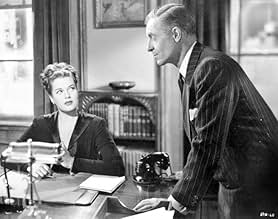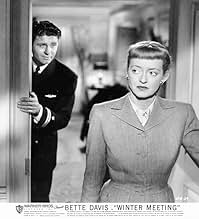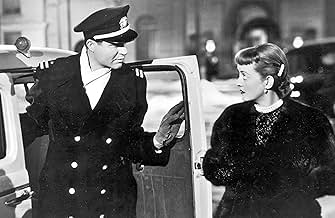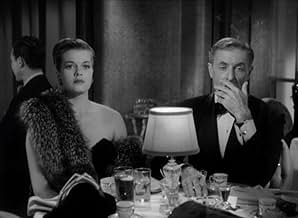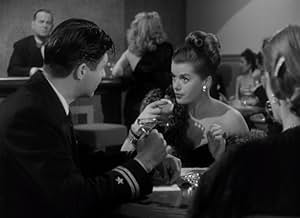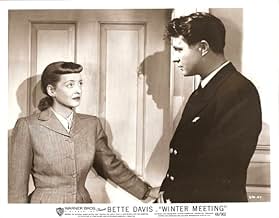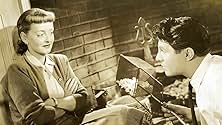IMDb-BEWERTUNG
6,2/10
1590
IHRE BEWERTUNG
Füge eine Handlung in deiner Sprache hinzuBette Davis is a successful poetess who falls in love with a war hero in this romantic melodrama that is a moving film experience any time of year.Bette Davis is a successful poetess who falls in love with a war hero in this romantic melodrama that is a moving film experience any time of year.Bette Davis is a successful poetess who falls in love with a war hero in this romantic melodrama that is a moving film experience any time of year.
- Regie
- Drehbuch
- Hauptbesetzung
Jim Davis
- Slick Novak
- (as James Davis)
Woody Herman
- Leader - Woody Herman and His Orchestra
- (as Woody Herman and His Orchestra)
Lois Austin
- Marcia
- (Nicht genannt)
Tex Brodus
- Restaurant Patron
- (Nicht genannt)
Gertrude Carr
- Woman on Subway
- (Nicht genannt)
Steve Carruthers
- Restaurant Patron
- (Nicht genannt)
Douglas Carter
- Waiter
- (Nicht genannt)
Hugh Charles
- Headwaiter
- (Nicht genannt)
Russ Clark
- Man in Cafe
- (Nicht genannt)
Franklyn Farnum
- Restaurant Patron
- (Nicht genannt)
Bess Flowers
- Restaurant Patron
- (Nicht genannt)
Charles Fogel
- Restaurant Patron
- (Nicht genannt)
Empfohlene Bewertungen
It takes good critiquing skills to fully appreciate the surprisingly seductive subtleties of Bette Davis during her motion picture making prime. Winter Meeting is an intellectual's & critic's delight. Davis doesn't ever step out of her leading role as an extremely constrained character, Susan Greive. I can't find a flaw in her meticulous performance. The story is also of interest to the period when it was filmed.
Bette Davis at 40yo & 59 films into the height of her acting career, stars as an accomplished, upscale poet, Susan Grieve. Although Grieve is well traveled from soliciting her literary work, she resides in a posh brownstone in NYC. Her closest friend & confidant is an old-monied dapper gentleman, complete with the social graces of exquisitely good taste, Stacy Grant (43yo John Hoyt).
Believing that his secretary Peggy Markham (Janis Paige) will seduce a visiting war hero, Slick Novak (James Davis), Grant arranges a dinner party for the foursome, including the very reserved & demure Grieve (Davis). Instead, Novak instantly falls for the ever so proper poet who has no romantic interests.
After Grieve & Novak engage in a private romance, she's romantically awakened in a way that she's never been before. As such, Grieve is falling in love with Novak. Something has to go wrong to upset as fine a romance as theirs, doesn't it? It always does....
This film offers no exception. Novak has a closely guarded secret that he discloses to Grieve that changes everything between them.
I found the best on-screen chemistry to be between Davis & Hoyt. Davis comes off as the kind of woman who enjoys being around elegant men who aren't hounding after women; perhaps even gay men. Hoyt fits that image to a T. Their ultra close friendship is worth more than any romance~
Bette Davis at 40yo & 59 films into the height of her acting career, stars as an accomplished, upscale poet, Susan Grieve. Although Grieve is well traveled from soliciting her literary work, she resides in a posh brownstone in NYC. Her closest friend & confidant is an old-monied dapper gentleman, complete with the social graces of exquisitely good taste, Stacy Grant (43yo John Hoyt).
Believing that his secretary Peggy Markham (Janis Paige) will seduce a visiting war hero, Slick Novak (James Davis), Grant arranges a dinner party for the foursome, including the very reserved & demure Grieve (Davis). Instead, Novak instantly falls for the ever so proper poet who has no romantic interests.
After Grieve & Novak engage in a private romance, she's romantically awakened in a way that she's never been before. As such, Grieve is falling in love with Novak. Something has to go wrong to upset as fine a romance as theirs, doesn't it? It always does....
This film offers no exception. Novak has a closely guarded secret that he discloses to Grieve that changes everything between them.
I found the best on-screen chemistry to be between Davis & Hoyt. Davis comes off as the kind of woman who enjoys being around elegant men who aren't hounding after women; perhaps even gay men. Hoyt fits that image to a T. Their ultra close friendship is worth more than any romance~
Bette Davis stars as lonely NYC poetess Susan Grieve. Her best friend Stacy (John Hoyt) asks her to accompany him on a blind double date along with visiting war hero Slick Novak (Jim Davis) and Stacy's secretary Peggy (Janis Paige). The sparks are immediate between Susan and Slick, and they spend a snowy weekend together in the country where they both confront deep-seated issues.
Bette Davis is dependably good, but Jim Davis is one of the worst regularly-employed actors in Hollywood history. Watching him struggle through his lines is almost as painful as it is humorous. When his character finally reveals his "dark secret", it elicited a chuckle rather than a gasp, which I don't think was the intention. The film's high point is a surprisingly open performance by John Hoyt as the proverbial "gay best friend" from countless future romance films. Of course it's never explicitly stated that Hoyt's Stacy is gay, given this is still the production code era. It's not a mocking or condescending performance, either, which is doubly surprising for the time. Some of the dialogue between he and Davis has a pre-Code vibe, rich in double entendre. If only his character had been in service of a better story and movie.
Bette Davis is dependably good, but Jim Davis is one of the worst regularly-employed actors in Hollywood history. Watching him struggle through his lines is almost as painful as it is humorous. When his character finally reveals his "dark secret", it elicited a chuckle rather than a gasp, which I don't think was the intention. The film's high point is a surprisingly open performance by John Hoyt as the proverbial "gay best friend" from countless future romance films. Of course it's never explicitly stated that Hoyt's Stacy is gay, given this is still the production code era. It's not a mocking or condescending performance, either, which is doubly surprising for the time. Some of the dialogue between he and Davis has a pre-Code vibe, rich in double entendre. If only his character had been in service of a better story and movie.
7jhkp
I've seen this film a few times, and, perhaps because I'm an admirer of Miss Davis, I've always enjoyed it. Her performance of the long scene in the country house is really magnificent. Brilliant, thrilling acting, of the highest order. I enjoyed the dialogue very much, because, unlike many films, we really get to hear someone let out their innermost thoughts and it's very much like such a scene would be in real life. I think you have to be in the mood for this picture, and it will not strike everyone the same way - but it would be sad not to be able to identify or sympathize with characters trying to come to grips with sad facts in their past, because that's all of us, at one time or another.
Bette Davis and Jim Davis have a "Winter Meeting" in this 1948 film about a spinster poetess and a heroic soldier. Based on a novel, it's an odd choice for a film, as it concerns two people wrestling with their inner selves. Both of them are carrying baggage, and each tries to help the other. That kind of scenario doesn't lend itself to the big screen.
There is a Waldo Lydecker character, this time named Stacy Grant, played by John Hoyt. He's the classy closet homosexual full of wit and vinegar who first introduces Susan (Bette) to Slick (Jim Davis), though he has invited his secretary (Janis Paige) as Slick's date. A morose man who obviously doesn't feel much like a war hero, Slick is interested in Susan, and the two begin a romance. She takes him to her house in Connecticut, a place filled with bad memories for her. There, the two fall in love and each discovers what's really bothering the other.
This is a slow moving film filled with dialogue - the lines almost outnumber the cigarettes. We're not used to dialogue anymore - it doesn't leave enough time for the special effects. What's off-kilter in this movie is the direction and the inexperience of Jim Davis, who later would achieve great fame as Jock Ewing on "Dallas." People on this board have said Bette Davis cringed during their love scenes, why did she agree to have him as her co-star, etc. First of all, she was crazy about him as a person and wanted to help him in his career, though that never materialized. I think I remember reading he went to Korea or something and when he got back, she'd never heard of him, though he did have an autographed photo of her as proof that he knew her. Secondly, Bette Davis was not Katharine Hepburn. Hepburn liked to surround herself with the best of the best; Davis, as she grew older, became more insecure and eventually wanted people around her she could cow. She hadn't quite reached that stage yet in "Winter Meeting," but we can see the early signs. She was on her way out at Warners and wasn't given a strong director who really could have pulled this together.
Despite this, Davis gives a very restrained performance; she's excellent. The problem is, why would a returning soldier be interested in her when he has Janis Paige hanging all over him? It stretches credibility. Paige here looks like a cross between a young Jane Fonda and Teri Hatcher - she's gorgeous. Davis looks like the atypical 1940s spinster aka career woman - tailored clothes and severe haircut. Pre-code career women had so much more fun - they dated, they went to bed with men, and they looked good. Then somebody decided it wasn't moral, and all girls should be married, and if you aren't, you'll end up frustrated and wearing suits like Davis wears in this. One can understand a serious young man like Slick being attracted to Davis' intelligence, and if she had looked the way she looked later on in the film (apparently after they had sex), one could have bought it so much more easily.
"Winter Meeting" is worth seeing for a wonderful Davis performance and the thought-provoking character studies. Though awkward at times, it's nevertheless interesting, and one does care about both of the main characters. You can't say that about some of the films today.
There is a Waldo Lydecker character, this time named Stacy Grant, played by John Hoyt. He's the classy closet homosexual full of wit and vinegar who first introduces Susan (Bette) to Slick (Jim Davis), though he has invited his secretary (Janis Paige) as Slick's date. A morose man who obviously doesn't feel much like a war hero, Slick is interested in Susan, and the two begin a romance. She takes him to her house in Connecticut, a place filled with bad memories for her. There, the two fall in love and each discovers what's really bothering the other.
This is a slow moving film filled with dialogue - the lines almost outnumber the cigarettes. We're not used to dialogue anymore - it doesn't leave enough time for the special effects. What's off-kilter in this movie is the direction and the inexperience of Jim Davis, who later would achieve great fame as Jock Ewing on "Dallas." People on this board have said Bette Davis cringed during their love scenes, why did she agree to have him as her co-star, etc. First of all, she was crazy about him as a person and wanted to help him in his career, though that never materialized. I think I remember reading he went to Korea or something and when he got back, she'd never heard of him, though he did have an autographed photo of her as proof that he knew her. Secondly, Bette Davis was not Katharine Hepburn. Hepburn liked to surround herself with the best of the best; Davis, as she grew older, became more insecure and eventually wanted people around her she could cow. She hadn't quite reached that stage yet in "Winter Meeting," but we can see the early signs. She was on her way out at Warners and wasn't given a strong director who really could have pulled this together.
Despite this, Davis gives a very restrained performance; she's excellent. The problem is, why would a returning soldier be interested in her when he has Janis Paige hanging all over him? It stretches credibility. Paige here looks like a cross between a young Jane Fonda and Teri Hatcher - she's gorgeous. Davis looks like the atypical 1940s spinster aka career woman - tailored clothes and severe haircut. Pre-code career women had so much more fun - they dated, they went to bed with men, and they looked good. Then somebody decided it wasn't moral, and all girls should be married, and if you aren't, you'll end up frustrated and wearing suits like Davis wears in this. One can understand a serious young man like Slick being attracted to Davis' intelligence, and if she had looked the way she looked later on in the film (apparently after they had sex), one could have bought it so much more easily.
"Winter Meeting" is worth seeing for a wonderful Davis performance and the thought-provoking character studies. Though awkward at times, it's nevertheless interesting, and one does care about both of the main characters. You can't say that about some of the films today.
The first thirty minutes may repel some.It's very talky ,it's filmed stage production style.This is a film which grows on you,you 've got to be patient for the "action" is minimal,and most amazing thing, in what is pure psychological drama ,there's not the easy way out : the flashbacks.Another director -it's the first film I've seen by Bretaigne Windust-would have at least enlivened things by introducing two very long flashbacks dealing with the two characters' past.Both have a secret to conceal .This is the very long conversation between them which reveals us that the poetess was demanding,idolizing her father,displaying no compassion for a mother who did not live up to her /their expectations;the soldier is a hero but someone told him something that has completely changed his way of seeing things .
People who expect a mushy romance ,a melodrama ,a love triangle (with the secretary) will be disappointed."Winter Meeting" shows the way to compassion for the others,be they hopeless.
People who expect a mushy romance ,a melodrama ,a love triangle (with the secretary) will be disappointed."Winter Meeting" shows the way to compassion for the others,be they hopeless.
Wusstest du schon
- WissenswertesThis film was a huge box office failure, bringing in less than half the cost of production and promotion. It was Bette Davis's biggest flop at Warner Bros. and came after Trügerische Leidenschaft (1946), another money-loser for the studio, causing Jack L. Warner to lose faith in Davis's box office appeal.
- PatzerWhen Stacey goes to Susan's apartment at the beginning of the film, he takes off a light-colored scarf. When he goes to leave, he puts on a much different and dark-colored scarf.
- Zitate
Stacy Grant: [to Peggy] Let me give you a piece of advice, culled from years of devestating experience. Next to loss of money, deafness, and skin disease, passion can be the most dangerous.
- VerbindungenFeatured in Salut für ...: Salut für Bette Davis (1977)
- SoundtracksIf I Could Be with You
(uncredited)
Music by James P. Johnson
Played when Susan and Stacey arrive at the restaurant
Top-Auswahl
Melde dich zum Bewerten an und greife auf die Watchlist für personalisierte Empfehlungen zu.
Details
- Erscheinungsdatum
- Herkunftsland
- Sprache
- Auch bekannt als
- Strange Meeting
- Drehorte
- Produktionsfirma
- Weitere beteiligte Unternehmen bei IMDbPro anzeigen
Box Office
- Budget
- 1.927.000 $ (geschätzt)
- Laufzeit
- 1 Std. 44 Min.(104 min)
- Farbe
- Seitenverhältnis
- 1.37 : 1
Zu dieser Seite beitragen
Bearbeitung vorschlagen oder fehlenden Inhalt hinzufügen


